威廉王子在央视宣传保护动物的英文演讲稿
保护动物英语演讲稿

保护动物英语演讲稿Ladies and gentlemen, distinguished guests, and fellow animal lovers,Thank you for gathering here today to discuss an important topic that affects us all - animal conservation.I stand before you to shed light on the urgent need to protect our precious wildlife and the crucial role each one of us can play in species preservation.Animals are an integral part of our planet's intricate ecosystem. They hold a indispensable position as keystone species in maintaining the balance of nature. Unfortunately, the world is currently experiencing analarming rate of species extinction. This is largely due to human activities such as habitat destruction, climate change, and illegal wildlife trade. It is our responsibility to reverse this trend and protect our fellow creatures who share this planet with us.Firstly, let us consider the importance of preserving biodiversity. Biodiversity ensures the stability and resilience of ecosystems. If one species becomes extinct, it can have a cascading effect on the entire food web, impacting other plants and animals that rely on it. For example, when the population of sea otters declined due to hunting in the 19th century, their prey, sea urchins, multiplied rapidly and overgrazed kelp forests, leading to a collapse in the ecosystem. This exampledemonstrates the interconnectedness of species and the vital role each organism plays in maintaining a healthy environment.Furthermore, protecting wildlife has tangible benefits for human communities. Many countries heavily rely on tourism as a significant source of income. By safeguarding our animal friends, we are preserving a valuable resource that attracts tourists from all around the world. Imagine a world without the majestic African elephants or the graceful humpback whales - our travel experiences and the economies of local communities would undoubtedly suffer.Let us not forget the ethical obligation to protect animals from unnecessary suffering. They share the Earth with us and have just as much right to exist and flourish. It is through our actions that we can ensure their physical and emotional well-being. For instance, the plight of factory farmed animals and the cruelty they endure is an issue that needs our attention. By supporting sustainable and ethical farming practices, we can make a difference in improving their lives.So, what can we do to protect our fellow inhabitants of this planet? Firstly, education is key. By spreading awareness about the importance of biodiversity and the current threats faced by many species, we can inspire individuals to take action. Schools, universities, andcommunity organizations should incorporate conservation topics into their curriculum and host awareness campaigns. This will foster a sense of responsibility and empower the younger generation to become champions of wildlife conservation.Secondly, stringent laws and regulations need to be put in place and enforced. Governments should invest in strengthening environmental protection agencies and providing them with the necessary resources to combat illegal poaching, logging, and habitat destruction. Additionally, international cooperation is crucial in addressing transnational wildlife crime networks that exploit living creatures for profit. This includes addressing the demand for wildlife products, such asivory, rhino horns, and exotic pets, through public awareness campaigns and stricter penalties for those involved in trafficking.Furthermore, sustainable development practices are essential in minimizing the negative impacts on wildlife. This involves responsibly managing natural resources, such as forests and oceans, and implementing sustainable agriculture practices that reduce habitat destruction and the use of harmful chemicals. By promoting sustainable tourism practices, such as ecotourism, we can ensure that local communities benefit from the beauty of wildlife while minimizing disturbance to their habitats.Lastly, individual actions matter. Each of us can make small but significant changes in our daily lives to protect animals. This includes adopting a plant-based diet, reducing our carbon footprint by opting for renewable energy sources, and supporting only responsible and ethical companies. We can also refrain from purchasing products derived from endangered species, such as ivory or tortoiseshell, and instead support sustainable alternatives.In conclusion, the protection of animals is not only an ethical duty but a key component in ensuring the health and survival of our planet. By safeguarding biodiversity, we maintain ecosystem stability, promote sustainable development, and preserve a valuablenatural heritage for future generations. Let us remember that we hold the power to make a difference—one action at a time. Together, we can create a world where animals thrive alongside us, and the wonders of the natural world are cherished and protected.Thank you.。
【双语演讲】威廉王子英语演讲:保护野生动物的重要性
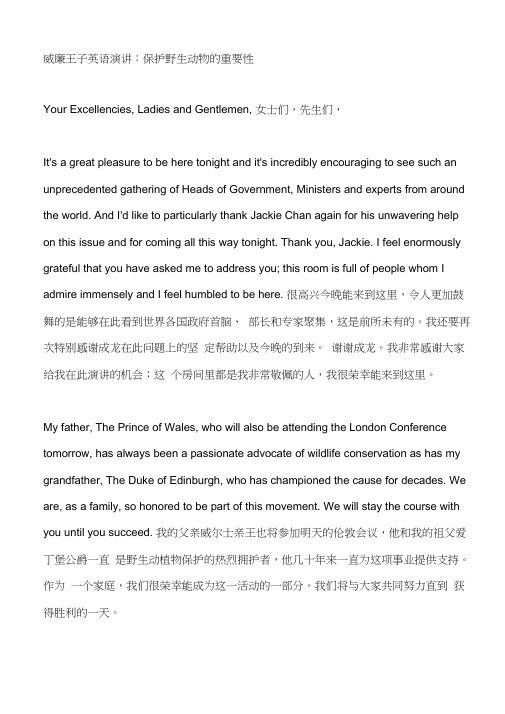
威廉王子英语演讲:保护野生动物的重要性Your Excellencies, Ladies and Gentlemen, 女士们,先生们,It's a great pleasure to be here tonight and it's incredibly encouraging to see such an unprecedented gathering of Heads of Government, Ministers and experts from around the world. And I'd like to particularly thank Jackie Chan again for his unwavering help on this issue and for coming all this way tonight. Thank you, Jackie. I feel enormously grateful that you have asked me to address you; this room is full of people whom I admire immensely and I feel humbled to be here. 很高兴今晚能来到这里,令人更加鼓舞的是能够在此看到世界各国政府首脑、部长和专家聚集,这是前所未有的。
我还要再次特别感谢成龙在此问题上的坚定帮助以及今晚的到来。
谢谢成龙。
我非常感谢大家给我在此演讲的机会;这个房间里都是我非常敬佩的人,我很荣幸能来到这里。
My father, The Prince of Wales, who will also be attending the London Conference tomorrow, has always been a passionate advocate of wildlife conservation as has my grandfather, The Duke of Edinburgh, who has championed the cause for decades. We are, as a family, so honored to be part of this movement. We will stay the course with you until you succeed. 我的父亲威尔士亲王也将参加明天的伦敦会议,他和我的祖父爱丁堡公爵一直是野生动植物保护的热烈拥护者,他几十年来一直为这项事业提供支持。
威廉王子上央视宣传动物保护英语演讲稿
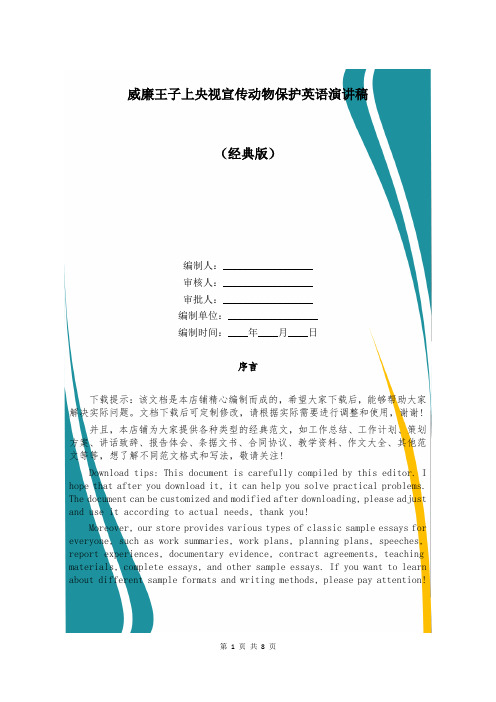
威廉王子上央视宣传动物保护英语演讲稿(经典版)编制人:__________________审核人:__________________审批人:__________________编制单位:__________________编制时间:____年____月____日序言下载提示:该文档是本店铺精心编制而成的,希望大家下载后,能够帮助大家解决实际问题。
文档下载后可定制修改,请根据实际需要进行调整和使用,谢谢!并且,本店铺为大家提供各种类型的经典范文,如工作总结、工作计划、策划方案、讲话致辞、报告体会、条据文书、合同协议、教学资料、作文大全、其他范文等等,想了解不同范文格式和写法,敬请关注!Download tips: This document is carefully compiled by this editor. I hope that after you download it, it can help you solve practical problems. The document can be customized and modified after downloading, please adjust and use it according to actual needs, thank you!Moreover, our store provides various types of classic sample essays for everyone, such as work summaries, work plans, planning plans, speeches, report experiences, documentary evidence, contract agreements, teaching materials, complete essays, and other sample essays. If you want to learn about different sample formats and writing methods, please pay attention!威廉王子上央视宣传动物保护英语演讲稿威廉王子上央视宣传动物保护英语演讲稿演讲稿是作为在特定的情境中供口语表达使用的文稿。
关于保护动物的英语演讲稿分钟(一)
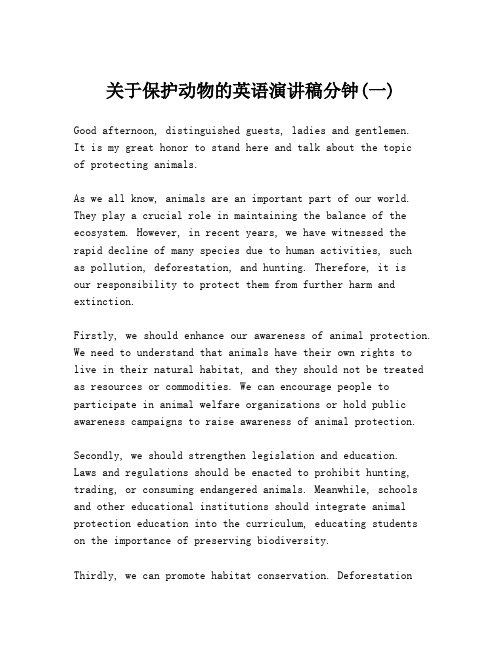
关于保护动物的英语演讲稿分钟(一)Good afternoon, distinguished guests, ladies and gentlemen.It is my great honor to stand here and talk about the topicof protecting animals.As we all know, animals are an important part of our world. They play a crucial role in maintaining the balance of the ecosystem. However, in recent years, we have witnessed the rapid decline of many species due to human activities, suchas pollution, deforestation, and hunting. Therefore, it isour responsibility to protect them from further harm and extinction.Firstly, we should enhance our awareness of animal protection. We need to understand that animals have their own rights tolive in their natural habitat, and they should not be treated as resources or commodities. We can encourage people to participate in animal welfare organizations or hold public awareness campaigns to raise awareness of animal protection.Secondly, we should strengthen legislation and education.Laws and regulations should be enacted to prohibit hunting, trading, or consuming endangered animals. Meanwhile, schools and other educational institutions should integrate animal protection education into the curriculum, educating students on the importance of preserving biodiversity.Thirdly, we can promote habitat conservation. Deforestationand pollution are major contributors to the destruction of animal habitats. Therefore, we can reduce our carbonfootprint by practicing environmentally-friendly lifestyles, such as reducing the use of disposable plastic or supporting companies that use renewable energy sources.Fourthly, we can support research and conservation efforts. Scientists can conduct research on endangered species to better understand their behavior and needs. We can support conservation organizations by volunteering our time, donating money, or participating in conservation activities.In conclusion, protecting animals is a vital task that requires our efforts, not only for the sake of the animals but also for the future of our planet. Let us start from ourselves and work together to build a more harmonious world where humans and animals can coexist peacefully. Thank you.。
保护老虎演讲英语作文
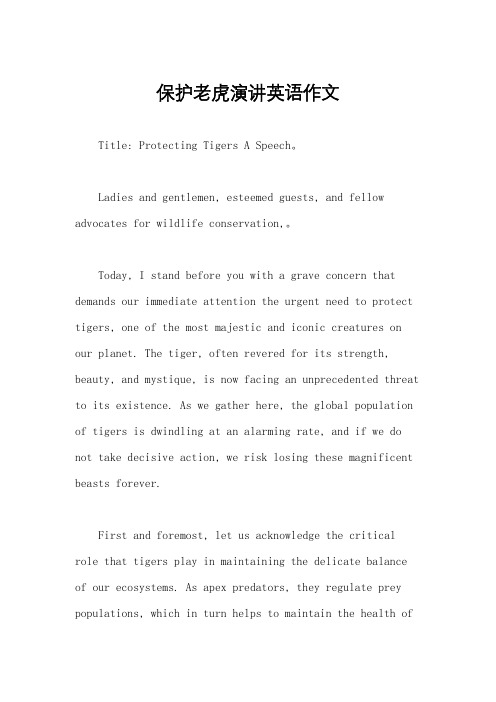
保护老虎演讲英语作文Title: Protecting Tigers A Speech。
Ladies and gentlemen, esteemed guests, and fellow advocates for wildlife conservation,。
Today, I stand before you with a grave concern that demands our immediate attention the urgent need to protect tigers, one of the most majestic and iconic creatures on our planet. The tiger, often revered for its strength, beauty, and mystique, is now facing an unprecedented threat to its existence. As we gather here, the global population of tigers is dwindling at an alarming rate, and if we do not take decisive action, we risk losing these magnificent beasts forever.First and foremost, let us acknowledge the criticalrole that tigers play in maintaining the delicate balance of our ecosystems. As apex predators, they regulate prey populations, which in turn helps to maintain the health ofthe entire ecosystem. Moreover, tigers are indicators of the overall health of their habitats. A decline in tiger populations reflects broader ecological degradation, which ultimately affects all living organisms, including humans.So, what are the primary threats facing tigers today? Chief among them is habitat loss and fragmentation due to human activities such as deforestation, urbanization, and agricultural expansion. As human populations grow, so does the demand for land, leading to the destruction of vital tiger habitats. Additionally, illegal poaching for their skins, bones, and other body parts continues to decimate tiger populations, driven by the lucrative illegal wildlife trade.To address these pressing challenges, concerted efforts must be made at both local and global levels. One crucial aspect is the protection and restoration of tiger habitats. Governments, NGOs, and local communities must work together to establish and enforce protected areas where tigers can thrive without the threat of human encroachment. Furthermore, sustainable land-use practices must bepromoted to ensure that human development does not come at the expense of wildlife habitats.Equally important is tackling the scourge of poaching and illegal wildlife trade. Strict enforcement of laws and harsh penalties for poachers and traffickers are essential to deter these criminal activities. Moreover, international cooperation is vital to disrupt the networks involved in the illicit trade of tiger parts. By strengthening law enforcement efforts and improving intelligence sharing, we can stem the flow of illegal wildlife products and protect endangered species like the tiger.Education and awareness-raising initiatives also play a crucial role in fostering a culture of conservation. It is imperative to educate communities living in and aroundtiger habitats about the importance of protecting these magnificent animals and the ecosystems they inhabit. By instilling a sense of pride and stewardship among local populations, we can empower them to become active participants in tiger conservation efforts.In conclusion, the plight of the tiger is a clarion call for action. We cannot afford to be passive bystanders while these iconic creatures teeter on the brink of extinction. It is incumbent upon all of us to rise to the challenge and work tirelessly to protect tigers and their habitats for future generations. Together, let us pledge our commitment to ensuring that the roar of the tiger continues to echo through the forests of our world. Thank you.。
英国威廉王子英语演讲稿
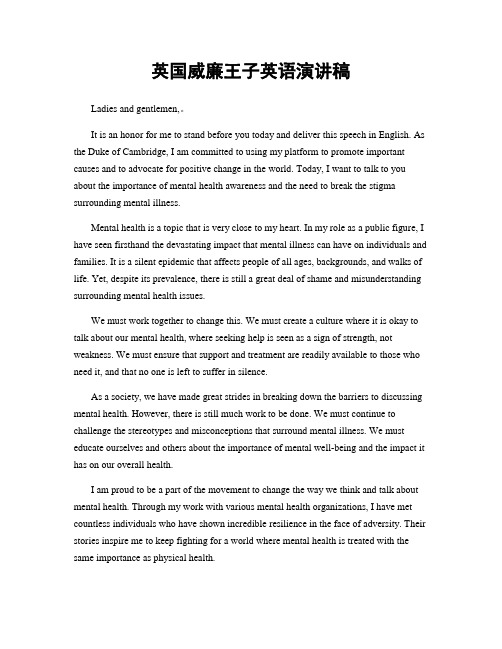
英国威廉王子英语演讲稿Ladies and gentlemen,。
It is an honor for me to stand before you today and deliver this speech in English. As the Duke of Cambridge, I am committed to using my platform to promote important causes and to advocate for positive change in the world. Today, I want to talk to you about the importance of mental health awareness and the need to break the stigma surrounding mental illness.Mental health is a topic that is very close to my heart. In my role as a public figure, I have seen firsthand the devastating impact that mental illness can have on individuals and families. It is a silent epidemic that affects people of all ages, backgrounds, and walks of life. Yet, despite its prevalence, there is still a great deal of shame and misunderstanding surrounding mental health issues.We must work together to change this. We must create a culture where it is okay to talk about our mental health, where seeking help is seen as a sign of strength, not weakness. We must ensure that support and treatment are readily available to those who need it, and that no one is left to suffer in silence.As a society, we have made great strides in breaking down the barriers to discussing mental health. However, there is still much work to be done. We must continue to challenge the stereotypes and misconceptions that surround mental illness. We must educate ourselves and others about the importance of mental well-being and the impact it has on our overall health.I am proud to be a part of the movement to change the way we think and talk about mental health. Through my work with various mental health organizations, I have met countless individuals who have shown incredible resilience in the face of adversity. Their stories inspire me to keep fighting for a world where mental health is treated with the same importance as physical health.I urge all of you to join me in this fight. Let us work together to create a world where everyone feels comfortable seeking help for their mental health, where no one feels ashamed to talk about their struggles, and where support is readily available to all who need it. Together, we can break the stigma and build a more compassionate and understanding society.In closing, I want to thank you for allowing me to share my thoughts on this important issue. Let us all continue to work towards a future where mental health is no longer a taboo subject, but rather a priority for us all.Thank you.。
威廉王子在2019非法野生动物贸易会议招待英语演讲稿
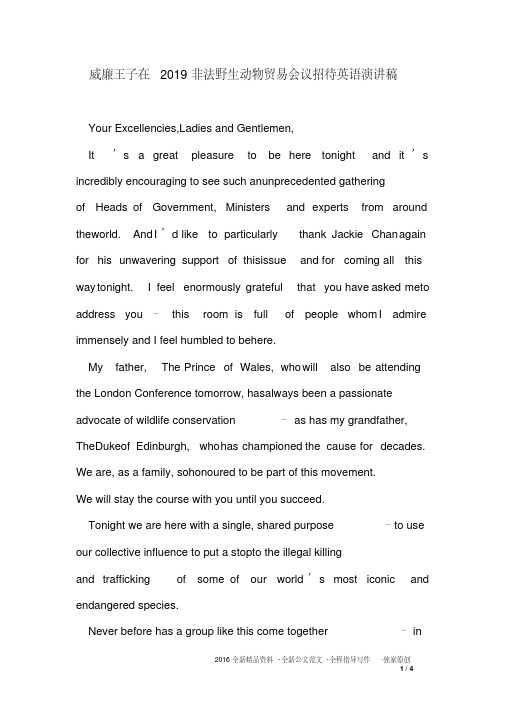
威廉王子在2019非法野生动物贸易会议招待英语演讲稿Your Excellencies,Ladies and Gentlemen,It’s a great pleasure to be here tonight and it’s incredibly encouraging to see such anunprecedented gatheringof Heads of Government, Ministers and experts from around theworld. And I’d like to particularly thank Jackie Chan a gain for his unwavering support of thisissue and for coming all this way tonight. I feel enormously grateful that you have asked meto address you –this room is full of people whom I admire immensely and I feel humbled to behere.My father, The Prince of Wales, who will also be attending the London Conference tomorrow, hasalways been a passionate advocate of wildlife conservation – as has my grandfather, TheDuke o f Edinburgh, who h as championed the cause for decades. We are, as a family, sohonoured to be part of this movement.We will stay the course with you until you succeed.Tonight we are here with a single, shared purpose–to use our collective influence to put a stopto the illegal killingand trafficking of some of our world’s most iconic and endangered species.Never before has a group like this come together – inthese numbers – to stop the illegal tradein wildlife. All ofus in this room have a duty to make sure that tomorrow, 13th February, is adate that marks the beginning of the end of this despicable trade.The Conference will bring together leaders from around the world who will pledge to reduceboth the supply and the demanddriving this trade. Let’s not for a second underestimate howimportant this step is.The illegal wildlife trade is now the 4th most lucrativetransnational crime after drugs, armsand human t rafficking. It is estimated to be worth between 10 and 20 billion dollars each year.Some might imagine it is a crime without human v ictim, but over 1,000 rangers have beenkilled in the past 10 years. Every week, another two rangers are murdered by poachers. There isalso evidence that poachers’activities are funding international terrorism.The scale of the trade continues to increase dramaticallyand is becoming ever moresophisticated. Poachers now operatein highly organized, international criminal gangs.Technologyis also being exploited for the sale of these goods, with illegal products openly andeasily available online.But we need to believe in our ability to turn the tide. Weneed to tackle wildlife crime with aconcerted global responseas vigorous and forceful as the trade itself. We need to setaside differences, speak with one voice and act as one global community. I am delighted thatthis is happening.As President of United for Wildlife, I am p roud that seven of the world’s largest field-basedorganisations, and my Foundation, have taken the first steps to create a powerful globalalliance, addressing both demand and supply issues. United for Wildlife recognises five specificareas which needto be addressed.If I may, I will briefly list them:First, we must strengthen protection for endangered species through the use ofsophisticated new technology, including GPS trackers and drones.Secondly, by working with experts in marketing, youth leaders and policy makers, we can workto reduce the consumer demand for illegally traded products.Thirdly, legal systems are key to fighting wildlife crime. We need to support the judiciary andlocal authorities to combat trafficking, and to shine a spotlight on successful law enforcement.Fourthly, we need to encourage the private sector–including shipping companies and others –to declare a ‘zero tolerance’ approach to the illegal wildlife trade.?Finally, and perhaps crucially, we need to support local communities to ensure their livelihoodsimprove as a directresult of these conservation efforts.The United for Wildlife organisations are committed tothese five pledges, which have beendrawn up because they are achievable. I know that all of you in your own ways are alreadyhelping to implement these pledges, too.Let me say again what I said a few moments ago: tonight isan unprecedented gathering. Thefact that we are all here gives me faith that we can turn the tide against the illegal wildlifetrade. Let’s turn tonight’s goodwill into action, and, please, let’s be part of the movementthat can tell our children and grandchildren that we saved these extraordinaryspecies forthem.Thank you so much for being here tonight.文章。
英文发言稿保护动物范文
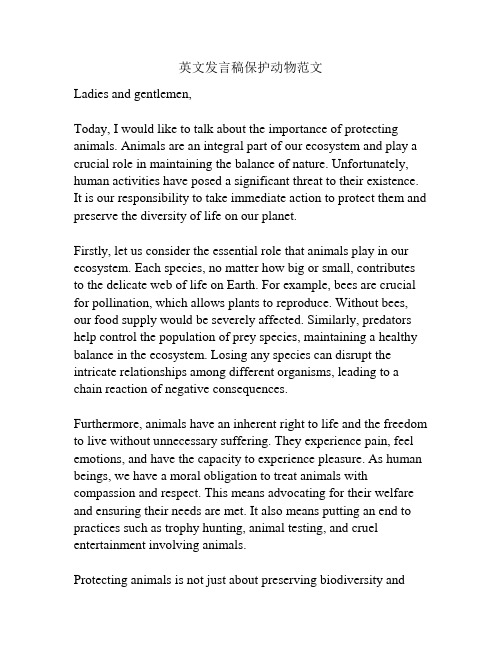
英文发言稿保护动物范文Ladies and gentlemen,Today, I would like to talk about the importance of protecting animals. Animals are an integral part of our ecosystem and play a crucial role in maintaining the balance of nature. Unfortunately, human activities have posed a significant threat to their existence. It is our responsibility to take immediate action to protect them and preserve the diversity of life on our planet.Firstly, let us consider the essential role that animals play in our ecosystem. Each species, no matter how big or small, contributes to the delicate web of life on Earth. For example, bees are crucial for pollination, which allows plants to reproduce. Without bees, our food supply would be severely affected. Similarly, predators help control the population of prey species, maintaining a healthy balance in the ecosystem. Losing any species can disrupt the intricate relationships among different organisms, leading to a chain reaction of negative consequences.Furthermore, animals have an inherent right to life and the freedom to live without unnecessary suffering. They experience pain, feel emotions, and have the capacity to experience pleasure. As human beings, we have a moral obligation to treat animals with compassion and respect. This means advocating for their welfare and ensuring their needs are met. It also means putting an end to practices such as trophy hunting, animal testing, and cruel entertainment involving animals.Protecting animals is not just about preserving biodiversity andacknowledging their rights; it is also about recognizing the benefits they provide to us. Many animals have contributed to significant scientific discoveries, such as medical breakthroughs and new technologies. By protecting them, we are promoting innovation and potential advancements that can benefit humanity.To protect animals effectively, we must work together as a global community. Governments, non-governmental organizations, and individuals all have a role to play. Governments can enact and enforce laws that prohibit the exploitation and abuse of animals. NGOs can raise awareness, conduct research, and support conservation efforts. As individuals, we can make conscious choices in our daily lives, such as adopting a plant-based diet, avoiding products tested on animals, and supporting organizations dedicated to animal protection.In conclusion, protecting animals is not only crucial for maintaining the balance of our ecosystem but also for recognizing their inherent rights and the benefits they bring to us. By taking action and making the necessary changes to our behavior, we can ensure a better future for animals and ourselves. Let us stand together, advocate for their protection, and work toward a world where all species can thrive. Thank you.。
英语保护动物发言稿范文
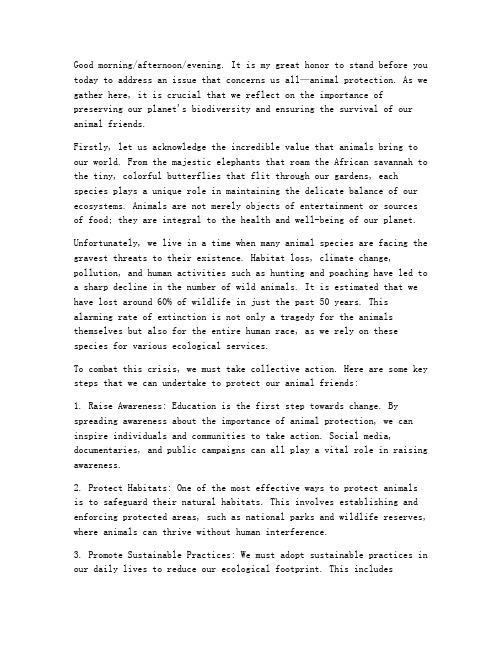
Good morning/afternoon/evening. It is my great honor to stand before you today to address an issue that concerns us all—animal protection. As we gather here, it is crucial that we reflect on the importance of preserving our planet's biodiversity and ensuring the survival of our animal friends.Firstly, let us acknowledge the incredible value that animals bring to our world. From the majestic elephants that roam the African savannah to the tiny, colorful butterflies that flit through our gardens, each species plays a unique role in maintaining the delicate balance of our ecosystems. Animals are not merely objects of entertainment or sources of food; they are integral to the health and well-being of our planet.Unfortunately, we live in a time when many animal species are facing the gravest threats to their existence. Habitat loss, climate change, pollution, and human activities such as hunting and poaching have led to a sharp decline in the number of wild animals. It is estimated that we have lost around 60% of wildlife in just the past 50 years. This alarming rate of extinction is not only a tragedy for the animals themselves but also for the entire human race, as we rely on these species for various ecological services.To combat this crisis, we must take collective action. Here are some key steps that we can undertake to protect our animal friends:1. Raise Awareness: Education is the first step towards change. By spreading awareness about the importance of animal protection, we can inspire individuals and communities to take action. Social media, documentaries, and public campaigns can all play a vital role in raising awareness.2. Protect Habitats: One of the most effective ways to protect animalsis to safeguard their natural habitats. This involves establishing and enforcing protected areas, such as national parks and wildlife reserves, where animals can thrive without human interference.3. Promote Sustainable Practices: We must adopt sustainable practices in our daily lives to reduce our ecological footprint. This includesreducing plastic waste, conserving water, and using renewable energy sources. By living more sustainably, we can help preserve the environments that animals depend on.4. Support Conservation Efforts: There are numerous organizations and initiatives dedicated to animal conservation. By supporting theseefforts through donations, volunteering, or advocacy, we can make a tangible difference in the fight to save our animal friends.5. Enforce Legislation: Governments must enact and enforce strict laws to protect animals from illegal hunting, poaching, and trade. International cooperation is essential to combat cross-border wildlife trafficking, which is a major threat to many species.6. Encourage Responsible Tourism: Sustainable tourism can have apositive impact on wildlife conservation. By promoting responsible tourism practices, we can ensure that local communities benefit from wildlife tourism while minimizing negative impacts on animal habitats.In conclusion, the protection of animals is not a task for a select few; it is a responsibility that falls on all of us. Each individual action, no matter how small, can contribute to the preservation of our planet's biodiversity. By working together, we can create a world where animals thrive and where future generations can continue to appreciate the beauty and wonder of wildlife.Let us commit to making a difference today. Let us stand up for those who cannot speak for themselves and ensure that our planet remains a vibrant and diverse place for all living beings. Thank you for your attention and support in this critical endeavor.Thank you.。
关于保护动物的英语演讲稿2024
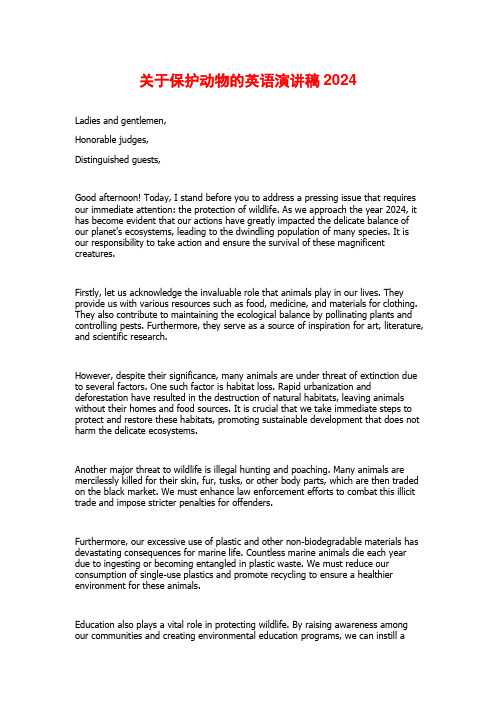
关于保护动物的英语演讲稿2024Ladies and gentlemen,Honorable judges,Distinguished guests,Good afternoon! Today, I stand before you to address a pressing issue that requires our immediate attention: the protection of wildlife. As we approach the year 2024, it has become evident that our actions have greatly impacted the delicate balance of our planet's ecosystems, leading to the dwindling population of many species. It is our responsibility to take action and ensure the survival of these magnificent creatures.Firstly, let us acknowledge the invaluable role that animals play in our lives. They provide us with various resources such as food, medicine, and materials for clothing. They also contribute to maintaining the ecological balance by pollinating plants and controlling pests. Furthermore, they serve as a source of inspiration for art, literature, and scientific research.However, despite their significance, many animals are under threat of extinction due to several factors. One such factor is habitat loss. Rapid urbanization and deforestation have resulted in the destruction of natural habitats, leaving animals without their homes and food sources. It is crucial that we take immediate steps to protect and restore these habitats, promoting sustainable development that does not harm the delicate ecosystems.Another major threat to wildlife is illegal hunting and poaching. Many animals are mercilessly killed for their skin, fur, tusks, or other body parts, which are then traded on the black market. We must enhance law enforcement efforts to combat this illicit trade and impose stricter penalties for offenders.Furthermore, our excessive use of plastic and other non-biodegradable materials has devastating consequences for marine life. Countless marine animals die each year due to ingesting or becoming entangled in plastic waste. We must reduce our consumption of single-use plastics and promote recycling to ensure a healthier environment for these animals.Education also plays a vital role in protecting wildlife. By raising awareness among our communities and creating environmental education programs, we can instill asense of responsibility and respect for animals in younger generations. It is crucial to teach the importance of sustainable practices, fostering a sense of empathy towards all living creatures.Lastly, international cooperation is essential for effective conservation efforts. Countries must collaborate to share knowledge, resources, and best practices in protecting wildlife. We must work together to enforce regulations and tackle transnational issues, such as illegal wildlife trafficking, which require a global response.In conclusion, as we enter 2024, it is imperative that we prioritize the protection of wildlife. Our actions today will determine the fate of numerous species and the overall health of our planet. Let us commit to preserving and restoring habitats, combating illegal hunting, reducing plastic waste, and educating future generations. By joining hands and taking decisive action, we can ensure that our children and grandchildren will inherit a world where wildlife thrives. Together, we can make a difference.Thank you.。
威廉王子向中国人发表关爱野生动物演讲(4)
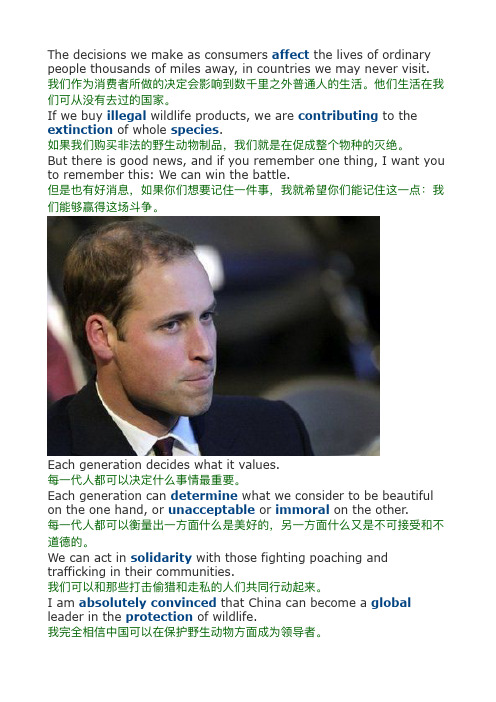
The decisions we make as consumers affect the lives of ordinary people thousands of miles away, in countries we may never visit. 我们作为消费者所做的决定会影响到数千⾥里里之外普通⼈人的⽣生活。
他们⽣生活在我们可从没有去过的国家。
If we buy illegal wildlife products, we are contributing to the extinction of whole species.如果我们购买⾮非法的野⽣生动物制品,我们就是在促成整个物种的灭绝。
But there is good news, and if you remember one thing, I want you to remember this: We can win the battle.但是也有好消息,如果你们想要记住⼀一件事,我就希望你们能记住这⼀一点:我们能够赢得这场⽃斗争。
Each generation decides what it values.每⼀一代⼈人都可以决定什什么事情最重要。
Each generation can determine what we consider to be beautiful on the one hand, or unacceptable or immoral on the other.每⼀一代⼈人都可以衡量量出⼀一⽅方⾯面什什么是美好的,另⼀一⽅方⾯面什什么⼜又是不不可接受和不不道德的。
We can act in solidarity with those fighting poaching and trafficking in their communities.我们可以和那些打击偷猎和⾛走私的⼈人们共同⾏行行动起来。
I am absolutely convinced that China can become a global leader in the protection of wildlife.我完全相信中国可以在保护野⽣生动物⽅方⾯面成为领导者。
保护动物演讲稿英语
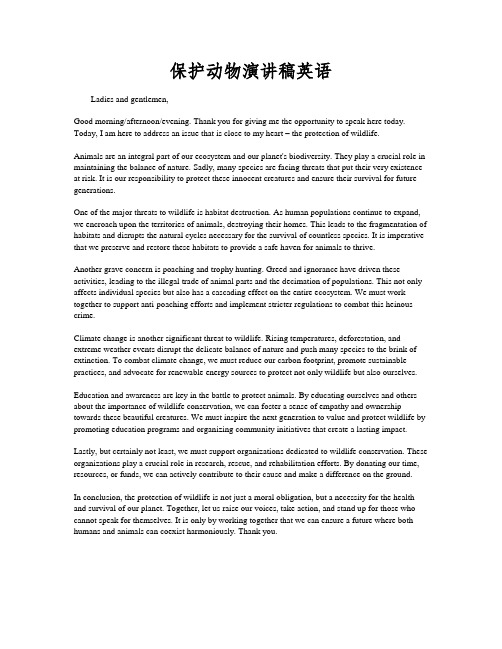
保护动物演讲稿英语Ladies and gentlemen,Good morning/afternoon/evening. Thank you for giving me the opportunity to speak here today. Today, I am here to address an issue that is close to my heart – the protection of wildlife.Animals are an integral part of our ecosystem and our planet's biodiversity. They play a crucial role in maintaining the balance of nature. Sadly, many species are facing threats that put their very existence at risk. It is our responsibility to protect these innocent creatures and ensure their survival for future generations.One of the major threats to wildlife is habitat destruction. As human populations continue to expand, we encroach upon the territories of animals, destroying their homes. This leads to the fragmentation of habitats and disrupts the natural cycles necessary for the survival of countless species. It is imperative that we preserve and restore these habitats to provide a safe haven for animals to thrive.Another grave concern is poaching and trophy hunting. Greed and ignorance have driven these activities, leading to the illegal trade of animal parts and the decimation of populations. This not only affects individual species but also has a cascading effect on the entire ecosystem. We must work together to support anti-poaching efforts and implement stricter regulations to combat this heinous crime.Climate change is another significant threat to wildlife. Rising temperatures, deforestation, and extreme weather events disrupt the delicate balance of nature and push many species to the brink of extinction. To combat climate change, we must reduce our carbon footprint, promote sustainable practices, and advocate for renewable energy sources to protect not only wildlife but also ourselves.Education and awareness are key in the battle to protect animals. By educating ourselves and others about the importance of wildlife conservation, we can foster a sense of empathy and ownership towards these beautiful creatures. We must inspire the next generation to value and protect wildlife by promoting education programs and organizing community initiatives that create a lasting impact.Lastly, but certainly not least, we must support organizations dedicated to wildlife conservation. These organizations play a crucial role in research, rescue, and rehabilitation efforts. By donating our time, resources, or funds, we can actively contribute to their cause and make a difference on the ground.In conclusion, the protection of wildlife is not just a moral obligation, but a necessity for the health and survival of our planet. Together, let us raise our voices, take action, and stand up for those who cannot speak for themselves. It is only by working together that we can ensure a future where both humans and animals can coexist harmoniously. Thank you.。
保护动物安全演讲稿英语(3篇)
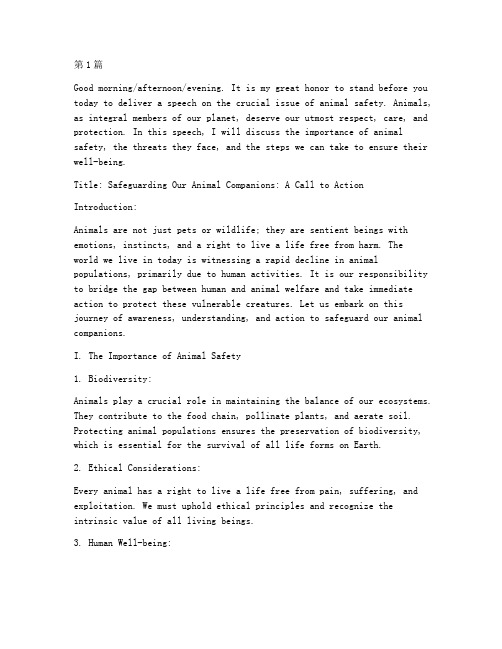
As individuals, we can make compassionate choices that contribute to animal safety. This includes adopting animals from shelters, supporting ethical brands, and being mindful of our consumption habits.
Title: Safeguarding Our Animal Companions: A Call to Action
Introduction:
Animals are not just pets or wildlife; they are sentient beings with emotions, instincts, and a right to live a life free from harm. The world we live in today is witnessing a rapid decline in animal populations, primarily due to human activities. It is our responsibility to bridge the gap between human and animal welfare and take immediate action to protect these vulnerable creatures. Let us embark on this journey of awareness, understanding, and action to safeguard our animal companions.
保护动物的演讲稿英文

保护动物的演讲稿英文Ladies and gentlemen,。
Today, I am honored to stand before you to talk about the importance of protecting animals. As we all know, animals play a crucial role in maintaining the balance of our ecosystem. However, due to human activities, many species are facing the threat of extinction. It is our responsibility to take action and protect these vulnerable creatures.First and foremost, we need to address the issue of habitat destruction. Human development, deforestation, and urbanization have led to the loss of natural habitats for many animals. Without a suitable environment, these animals struggle to survive and reproduce. Therefore, it is essential for us to conserve and protect their habitats, such as forests, wetlands, and grasslands.Secondly, we must tackle the problem of poaching and illegal wildlife trade. Many animals are hunted and traded for their fur, ivory, and other body parts. This not only threatens the survival of these species but also disrupts the balance of the ecosystem. We need to strengthen law enforcement, impose strict penalties for poachers, and raise public awareness about the consequences of illegal wildlife trade.Furthermore, climate change is another major threat to animals. Rising temperatures, extreme weather events, and sea-level rise are impacting the habitats of many species. It is crucial for us to take action to reduce our carbon footprint, promote sustainable energy sources, and protect natural ecosystems to mitigate the impacts of climate change on animals.In addition, we need to address the issue of pollution. Pollution from industrial waste, plastic debris, and chemical contaminants is harming wildlife and their habitats. We must work towards reducing pollution, promoting recycling, and implementing stricter regulations to protect animals from the harmful effects of pollution.Lastly, education and awareness are key to protecting animals. We need to educate the public, especially the younger generation, about the importance of wildlifeconservation. By promoting environmental education and fostering a sense of empathy and respect for animals, we can inspire people to take action and make a positive impact on the protection of animals.In conclusion, protecting animals is not only a moral obligation but also essential for the preservation of our planet's biodiversity. By addressing the issues of habitat destruction, poaching, climate change, pollution, and promoting education and awareness, we can work together to ensure a sustainable future for all living creatures. Let us take action now to protect and preserve the magnificent animals that share our planet with us. Thank you.。
保护动物发言稿范文英语
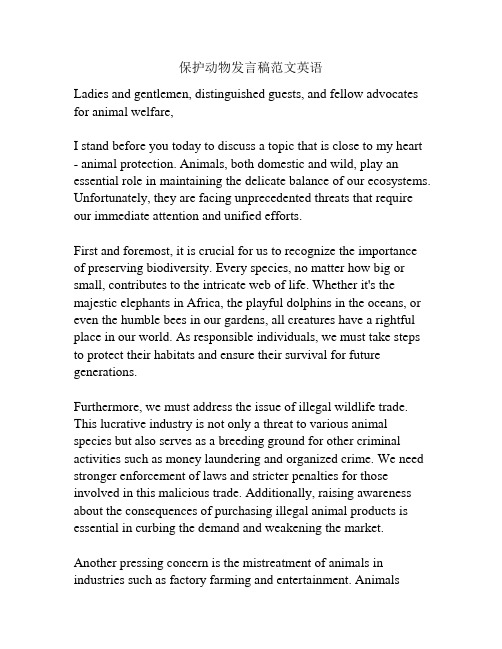
保护动物发言稿范文英语Ladies and gentlemen, distinguished guests, and fellow advocates for animal welfare,I stand before you today to discuss a topic that is close to my heart - animal protection. Animals, both domestic and wild, play an essential role in maintaining the delicate balance of our ecosystems. Unfortunately, they are facing unprecedented threats that require our immediate attention and unified efforts.First and foremost, it is crucial for us to recognize the importance of preserving biodiversity. Every species, no matter how big or small, contributes to the intricate web of life. Whether it's the majestic elephants in Africa, the playful dolphins in the oceans, or even the humble bees in our gardens, all creatures have a rightful place in our world. As responsible individuals, we must take steps to protect their habitats and ensure their survival for future generations.Furthermore, we must address the issue of illegal wildlife trade. This lucrative industry is not only a threat to various animal species but also serves as a breeding ground for other criminal activities such as money laundering and organized crime. We need stronger enforcement of laws and stricter penalties for those involved in this malicious trade. Additionally, raising awareness about the consequences of purchasing illegal animal products is essential in curbing the demand and weakening the market. Another pressing concern is the mistreatment of animals in industries such as factory farming and entertainment. Animalssubjected to cruel conditions for the sake of profit or entertainment suffer both physically and emotionally. It is our duty to advocate for better animal welfare standards and promote alternatives that do not exploit animals for our benefit. By supporting local farmers who prioritize humane practices and boycotting businesses that continue to prioritize profits over compassion, we can make a significant difference.Education remains a vital tool in the fight to protect animals. By educating the younger generation about the importance of coexisting with animals and the consequences of our actions, we can inspire the next wave of animal advocates. Incorporating animal welfare into school curricula, organizing workshops, and supporting educational initiatives are all effective ways to instill a sense of responsibility and empathy towards our fellow creatures.In conclusion, the preservation of animal life should be a shared responsibility. By protecting animals, we not only preserve the delicate balance of nature but also safeguard our own future. Let us work hand in hand to ensure a world where animals are treated with compassion, dignity, and respect. Together, we can make a difference.Thank you.。
2019-威廉王子在201X非法野生动物贸易会议招待英语演讲稿-word范文模板 (3页)
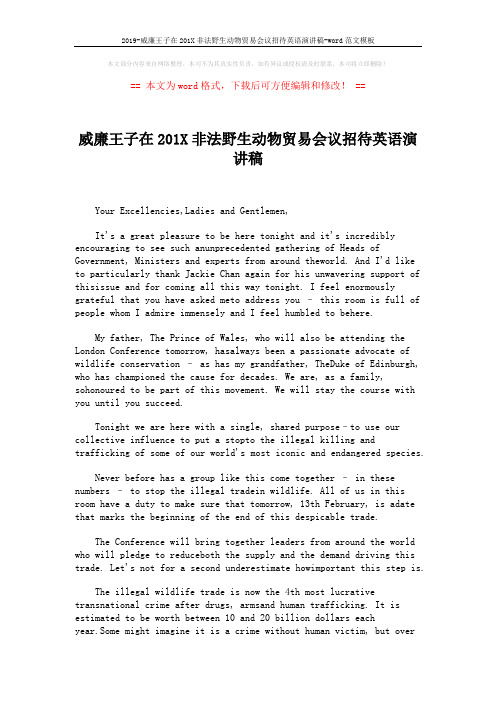
本文部分内容来自网络整理,本司不为其真实性负责,如有异议或侵权请及时联系,本司将立即删除!== 本文为word格式,下载后可方便编辑和修改! ==威廉王子在201X非法野生动物贸易会议招待英语演讲稿Your Excellencies,Ladies and Gentlemen,It's a great pleasure to be here tonight and it's incredibly encouraging to see such anunprecedented gathering of Heads of Government, Ministers and experts from around theworld. And I'd liketo particularly thank Jackie Chan again for his unwavering support of thisissue and for coming all this way tonight. I feel enormously grateful that you have asked meto address you – this room is full of people whom I admire immensely and I feel humbled to behere.My father, The Prince of Wales, who will also be attending the London Conference tomorrow, hasalways been a passionate advocate of wildlife conservation – as has my grandfather, TheDuke of Edinburgh, who has championed the cause for decades. We are, as a family, sohonoured to be part of this movement. We will stay the course with you until you succeed.Tonight we are here with a single, shared purpose–to use our collective influence to put a stopto the illegal killing andtrafficking of some of our world's most iconic and endangered species.Never before has a group like this come together – in these numbers – to stop the illegal tradein wildlife. All of us in this room have a duty to make sure that tomorrow, 13th February, is adate that marks the beginning of the end of this despicable trade.The Conference will bring together leaders from around the world who will pledge to reduceboth the supply and the demand driving this trade. Let's not for a second underestimate howimportant this step is.The illegal wildlife trade is now the 4th most lucrative transnational crime after drugs, armsand human trafficking. It is estimated to be worth between 10 and 20 billion dollars eachyear.Some might imagine it is a crime without human victim, but over1,000 rangers have beenkilled in the past 10 years. Every week, another two rangers are murdered by poachers. There isalso evidence that poachers' activities are funding international terrorism.The scale of the trade continues to increase dramatically and is becoming ever moresophisticated. Poachers now operate in highly organized, international criminal gangs.Technology is also being exploited for the sale of these goods, with illegal products openly andeasily available online.But we need to believe in our ability to turn the tide. We need to tackle wildlife crime with aconcerted global response as vigorous and forceful as the trade itself. We need to setaside differences, speak with one voice and act as one global community. I am delighted thatthis is happening.As President of United for Wildlife, I am proud that seven of the world's largest field-basedorganisations, and my Foundation, have taken the first steps to create a powerful globalalliance, addressing both demand and supply issues. United for Wildlife recognises five specificareas which need to be addressed.If I may, I will briefly list them:First, we must strengthen protection for endangered species through the use ofsophisticated new technology, including GPS trackers and drones.Secondly, by working with experts in marketing, youth leaders and policy makers, we can workto reduce the consumer demand for illegally traded products.Thirdly, legal systems are key to fighting wildlife crime. We need to support the judiciary andlocal authorities to combat trafficking, and to shine a spotlight on successful law enforcement.Fourthly, we need to encourage the private sector–including shipping companies and others –to declare a 'zero tolerance' approach to the illegal wildlife trade.?Finally, and perhaps crucially, we need to support local communities to ensure their livelihoodsimprove as a direct result of these conservation efforts.。
保护动物英文演讲稿大学
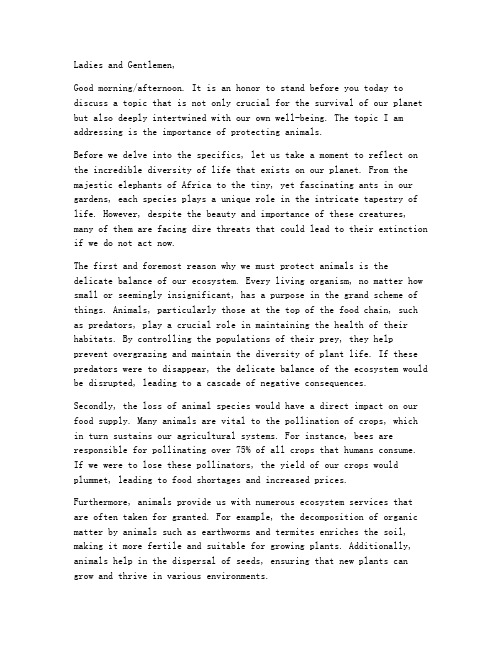
Ladies and Gentlemen,Good morning/afternoon. It is an honor to stand before you today to discuss a topic that is not only crucial for the survival of our planet but also deeply intertwined with our own well-being. The topic I am addressing is the importance of protecting animals.Before we delve into the specifics, let us take a moment to reflect on the incredible diversity of life that exists on our planet. From the majestic elephants of Africa to the tiny, yet fascinating ants in our gardens, each species plays a unique role in the intricate tapestry of life. However, despite the beauty and importance of these creatures, many of them are facing dire threats that could lead to their extinction if we do not act now.The first and foremost reason why we must protect animals is thedelicate balance of our ecosystem. Every living organism, no matter how small or seemingly insignificant, has a purpose in the grand scheme of things. Animals, particularly those at the top of the food chain, such as predators, play a crucial role in maintaining the health of their habitats. By controlling the populations of their prey, they help prevent overgrazing and maintain the diversity of plant life. If these predators were to disappear, the delicate balance of the ecosystem would be disrupted, leading to a cascade of negative consequences.Secondly, the loss of animal species would have a direct impact on our food supply. Many animals are vital to the pollination of crops, whichin turn sustains our agricultural systems. For instance, bees are responsible for pollinating over 75% of all crops that humans consume.If we were to lose these pollinators, the yield of our crops would plummet, leading to food shortages and increased prices.Furthermore, animals provide us with numerous ecosystem services that are often taken for granted. For example, the decomposition of organic matter by animals such as earthworms and termites enriches the soil, making it more fertile and suitable for growing plants. Additionally, animals help in the dispersal of seeds, ensuring that new plants can grow and thrive in various environments.Now, let us turn our attention to the causes of animal extinction and the role we, as individuals and a society, play in this crisis. One of the primary reasons for the decline of animal populations is habitat loss. As human populations grow and urbanize, we encroach upon the natural habitats of countless species, pushing them to the brink of extinction. Deforestation, land conversion for agriculture, and urban sprawl are just a few examples of human activities that contribute to habitat loss.Another significant threat to animals is climate change. Rising temperatures, changing weather patterns, and sea-level rise are disrupting the natural habitats of many species, forcing them to migrate to new areas where they may not be adapted to survive. This can lead to competition for resources, disease, and ultimately, extinction.The role of poaching and illegal wildlife trade cannot be overlooked. The demand for animal products, such as ivory, rhino horn, and shark fins, has led to the relentless killing of these species. The scale of this trade is staggering, and it is a clear indication of the greed and disregard for life that we as a society must confront.So, what can we do to protect animals and their habitats? The answerlies in collective action and a shift in mindset. Here are a few suggestions:1. Raise Awareness: Educate yourself and others about the importance of protecting animals and their habitats. The more people who understand the gravity of the situation, the greater the likelihood of positive change.2. Support Conservation Efforts: Donations to wildlife conservation organizations can go a long way in protecting endangered species and their natural habitats.3. Reduce Your Carbon Footprint: Climate change is a significant threat to animal populations. By reducing your carbon footprint, you contribute to the mitigation of this crisis.4. Choose Sustainable Products: Avoid purchasing products derived from endangered species, such as ivory, rhino horn, and shark fins. Support companies that prioritize sustainability and ethical sourcing.5. Advocate for Policy Change: Encourage your government representatives to implement and enforce policies that protect wildlife and their habitats.6. Engage in Responsible Tourism: When visiting natural habitats, respect the local wildlife and their environment. Avoid supporting activities that exploit animals for entertainment.In conclusion, the protection of animals is not a luxury but a necessity for the survival of our planet and our own well-being. By recognizing the importance of the delicate balance of our ecosystems, we can take action to protect these incredible creatures and their habitats. Let us rise to the challenge and ensure that future generations can continue to marvel at the beauty and diversity of life on Earth.Thank you for your attention, and let us work together to create a world where animals can thrive without the threat of extinction.[Applause]。
保护珍稀动物英语演讲稿

保护珍稀动物英语演讲稿IntroductionGood evening, ladies and gentlemen. It is my great honor to stand here and talk about the importance of protecting endangered species. As we all know, our planet is home to a wide variety of animals, each playing its own unique role in the ecosystem. However, human activities have caused dramatic declines in many animal populations. Today, I will focus on the issue of protecting endangered species and why it is vital for the future of our planet.The ProblemFirstly, let us take a look at the problem. Many of the world’s animals are at risk of extinction due to human activities such as habitat destruction, climate change, poaching, and pollution. Once gone, these animals cannot be brought back, and their loss can have irreversible effects on our planet’s eco systems.Take the rhinoceros, for example, one of the most endangered animals in the world. Poaching has wiped out entire populations of rhinos, leaving only a few remaining in the wild. These animals play a crucial role in their ecosystems and without them, the balance of their habitat is disturbed. In addition, their loss would be a great loss to humanity, given the cultural, scientific, and economic value associated with these animals.The SolutionSo, what can we do to protect these beautiful creatures? There are many ways to contribute to conservation efforts. The first is to simply spread awareness. Many people are unaware of the severity of the situation, and we need to help educate and inform them on the importance of protecting endangered species.Another way is to support organizations focused on conservation, as well as research and development of breeding programs. These programs promote the breeding of endangered species in captivity, and then reintroduce them into the wild. By supporting these organizations, we can help provide funding for their efforts, and in turn, aid in saving these animals.Furthermore, consumers can also contribute by making informed choices when they purchase products made from endangered species. For example, tiger bone is used in some traditional medicines, and by choosing alternative treatments, we can help reduce the demand for such products.ConclusionIn conclusion, we all have a responsibility to protect endangered species and the ecosystems in which they live. By raising awareness, supporting conservation organizations, and making informed choices as consumers, we can all play a part in saving these magnificent creatures from extinction.As Dr. Jane Goodall once said,。
威廉王子保护野生动物英语演讲双语文稿

A speech by The Duke of Cambridge to mark the London Conference on the Illegal Wildlife Trade 威廉王子英语演讲:保护野生动物的重要性在面对野生动物猎杀和贩卖问题上,威廉王子早就呼吁社会各界人士一起行动起来制止这种行为,今天木白把演讲视频和文稿都分享给大家,希望多年以后,我们能够对自己的子孙后代自豪的说,曾经为此贡献了自己的力量。
“Let's be part of the movement that can tell our children and grandchildren that we saved these extraordinary species for them.”请让我们成为能够告诉我们的子孙后代,我们在为他们保护这些珍惜物种的行动中,贡献了自己的力量。
Your Excellencies, Ladies and Gentlemen,女士们,先生们,It's a great pleasure to be here tonight and it's incredibly encouraging to see such an unprecedented gathering of Heads of Government, Ministers and experts from around the world. And I'd like to particularly thank Jackie Chan again for his unwavering help on this issue and for coming all this way tonight. Thank you, Jackie. I feel enormously grateful that you have asked me to address you; this room is full of people whom I admire immensely and I feel humbled to be here. 很高兴今晚能来到这里,令人更加鼓舞的是能够在此看到世界各国政府首脑、部长和专家聚集,这是前所未有的。
- 1、下载文档前请自行甄别文档内容的完整性,平台不提供额外的编辑、内容补充、找答案等附加服务。
- 2、"仅部分预览"的文档,不可在线预览部分如存在完整性等问题,可反馈申请退款(可完整预览的文档不适用该条件!)。
- 3、如文档侵犯您的权益,请联系客服反馈,我们会尽快为您处理(人工客服工作时间:9:00-18:30)。
威廉王子在央视宣传保护动物的英文演讲
稿
Ladies and gentlemen,
Never before have we had so many different ways totalk to one another.
In the distant past, written documents would becarried by hand across thousands of miles from Chinato Western Europe.
Today, we access knowledge from all over the world,through our mobile phones, at the tap of a key.
Wherever you are watching this programme –whether in this hall, at work, with your friends, orat home with your families;
Xièxiè. [Thank you.]
Hen gaoxing he ni jianmian. [Im pleased to meet you.]
Thank you for welcoming me into your homes.
Many of the most important conversations we have in our lives, take place in the family home.
The home is where we learn from our parents and grandparents, teach our own children, andshare our stories and hopes for the future. It is where many of our ideas and values are firstkindled.
In that spirit, there is one subject I believe we
have to discuss, around our family tables andacross the generations.
It concerns the future, and I know the Chinese are a far-sighted people.
It concerns particularly the environment, and I know that protecting Chinas rich and beautifulnatural heritage is important to all Chinese families.
It is the mass destruction and trafficking of iconic endangered species;
And it is time to talk about the growing human demand for illegal wildlife products that drivesthe trade and makes it profitable.
Today, we face an unprecedented surge in the brutal slaughter of iconic animals by poachers.
In South Africa, for example, one rhino was killed every month until 20xx. But last year, threerhinos were killed every single day.
In the 33 years since I was born, we have lost around 70 percent of Africas elephantpopulation. Of those that are left, 20,000 are being killed every year – that is 54 elephantskilled every single day.
At this rate, children born this year – like my daughter Charlotte – will see the last wildelephants and rhinos die before their 25th birthdays.
威廉王子在央视宣传保护动物的英文演讲稿。
